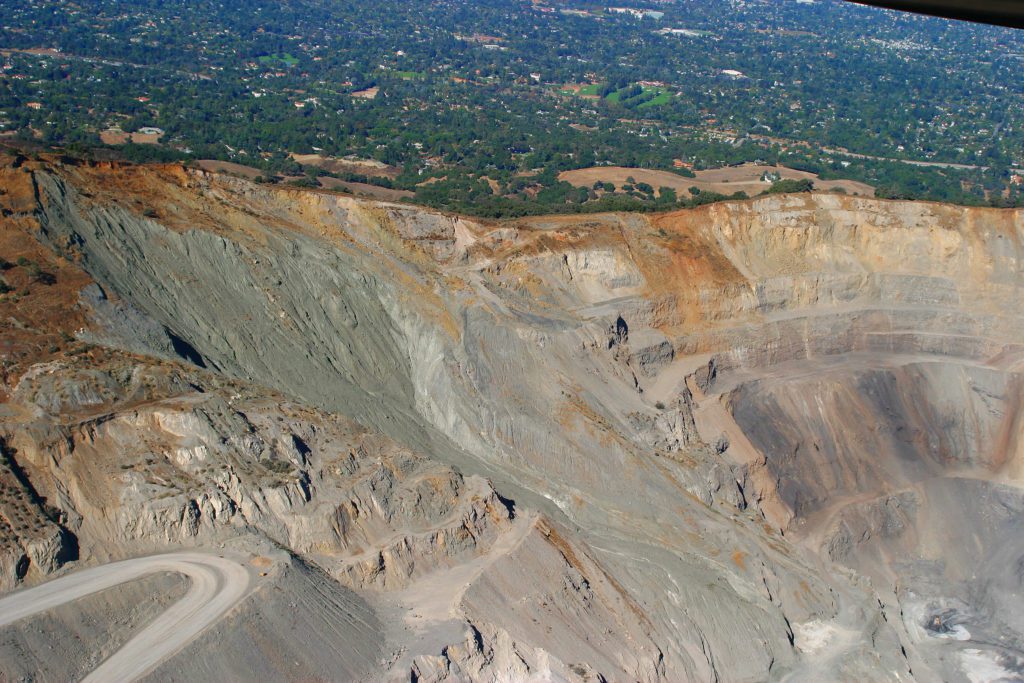Residents and elected leaders are applauding the Santa Clara County Board of Supervisors for taking steps to shed light on the complete record of violations at the only cement manufacturer in the Bay Area.
The board voted unanimously last week on a referral from Supervisor Joe Simitian to create a report documenting all violations relating to the Lehigh Permanente Quarry and Cement Plant. The 3,510-acre operation, which includes a plant and quarry, spans across unincorporated Santa Clara County, Cupertino and Palo Alto. Over the years, locals have complained the mining operation pollutes the water and air and ruins the visual beauty of the natural environment.
Simitian told San José Spotlight he believes the report is necessary to keep track of all the regulatory enforcement actions by the 14 local, county, state and federal agencies that oversee Lehigh’s operations. Getting a clearer scope of the violations will also help the board better understand the magnitude of violations over the last few years, and what kind of action should be taken.
“I think it’s time to start asking ourselves what is the long-term future of this site,” Simitian said. “What is the long-term future here and how is that going to be managed?”
It’s unclear what prompted the board to take this action now. The county and other enforcement agencies, including the San Francisco Bay Regional Water Quality Control Board and the EPA, have issued violations against operators of the plant and quarry dating back years. Violations have ranged from discharging chemically-tainted water into local streams, exceeding local noise ordinances with loud trucks and releasing emissions that increase air pollution. In 2018, the county closed a utility road on the Lehigh property after learning the company used it without permission to haul loads of mined rocks each day.

In 2019, Lehigh submitted an application to the county to expand its mining operations into the surrounding hillside, raising alarm among environmental advocates who say this will exacerbate erosion and require further truck trips through Cupertino. Last year, the county began to review how much it will cost to clean up the quarry and restore the land at a future date.
Simitian, who has held half a dozen town halls since 2013 to keep locals up to date about the plant, suggested the board needs comprehensive records to find out if Lehigh has violated the use permit granted to it by the county in 1939. The permit contains a provision stating the board has a right to suspend the permit if it finds there has been a violation, although it doesn’t provide much detail.
Lehigh did not respond to a request for comment. In a letter sent to supervisors on Jan. 24, Lehigh general counsel and Vice President Carol Lowry said the company’s highest priority is operating safely and complying with regulations. Lowry also noted Lehigh maintains transparency by holding monthly tours of its site and calls with county staff.
“We look forward to reviewing the consolidated historical report as proposed in the referral letter and respectfully request the opportunity to present Lehigh’s responses to each matter,” Lowry said.
Scrutinizing enforcement
Leaders from communities near the quarry and plant say they’re grateful the board is scrutinizing Lehigh’s enforcement record. Los Altos Mayor Anita Enander told San José Spotlight her city has had long-standing environmental concerns about the quarry, such as pollution entering Permanente Creek, which drains from the quarry and runs through Los Altos. Enander said she’s attended several town halls and found them helpful, but believes more could be done to inform residents.
“It’s not really practical for a city to try to keep track of all this,” she said. “It’s really great the county is stepping up and trying to pull this all together.”
Cupertino maintains a public collection of Lehigh’s violations on its website, but the list is small and many of the notices date back more than a decade. It doesn’t include more recent violations, such as the $60,000 penalty imposed on Lehigh by the San Francisco Bay Regional Water Quality Control Board in 2021 after the company discharged millions of gallons of chlorinated water into Permanente Creek.
“Supervisor Simitian is trying to get a little more public transparency out in the general arena about what has been done over the years, and where the violations are, because the public wants to have that cohesive oversight,” Cupertino Mayor Darcy Paul told San José Spotlight.
Cupertino resident Rhoda Fry has tracked Lehigh’s violations for years. She claims regulatory agencies have been slow to take enforcement actions against Lehigh. Fry also believes even with the enforcement records, the county isn’t going to have a complete picture of all of Lehigh’s infractions.
“The data he’s not going to get are the things that should have been violations—things that were reported and never acted upon,” Fry told San José Spotlight.
Contact Eli Wolfe at [email protected] or @EliWolfe4 on Twitter.



Leave a Reply
You must be logged in to post a comment.